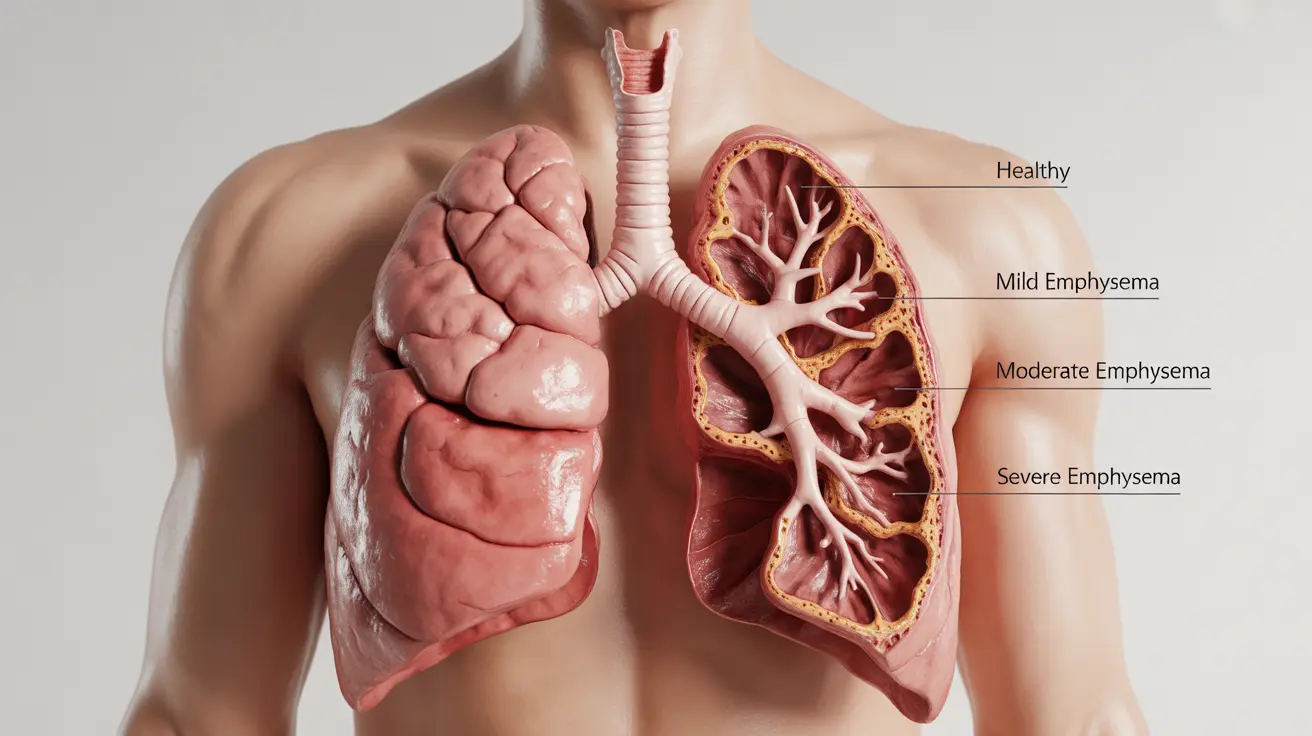Emphysema is a progressive lung disease that develops over time, causing damage to the air sacs (alveoli) in your lungs. Understanding the different stages of emphysema is crucial for both patients and healthcare providers, as it helps determine the most effective treatment approach and manage expectations for the condition's progression.
This comprehensive guide will explore how emphysema develops through various stages, what to expect at each phase, and the available treatment options to help manage symptoms and slow disease progression.
How Emphysema Stages Are Determined
Healthcare providers use several methods to diagnose and stage emphysema, with spirometry being the primary testing method. These tests measure important aspects of lung function, including:
- Forced Expiratory Volume in one second (FEV1)
- Forced Vital Capacity (FVC)
- The ratio between these two measurements (FEV1/FVC)
The results of these tests, combined with symptoms and overall health assessment, help determine the stage of emphysema.
Early Stage Emphysema
In the early stages of emphysema, symptoms may be mild or barely noticeable. Common indicators include:
- Mild shortness of breath, especially during physical activity
- Occasional coughing
- Slight decrease in exercise tolerance
Many people at this stage might dismiss these symptoms as normal aging or being out of shape. However, early detection and treatment are crucial for better outcomes.
Moderate Stage Emphysema
As emphysema progresses to the moderate stage, symptoms become more noticeable and begin to affect daily activities. Key characteristics include:
- Increased shortness of breath during routine activities
- Regular coughing, sometimes with mucus
- Reduced lung function
- Fatigue
- Difficulty completing regular daily tasks
Severe Stage Emphysema
In the severe stage, emphysema significantly impacts quality of life. Symptoms intensify and may include:
- Chronic shortness of breath, even at rest
- Frequent respiratory infections
- Significant weight loss
- Barrel chest appearance
- Blue tinge to lips or fingernails (cyanosis)
- Difficulty completing basic daily activities
Treatment Approaches Across Stages
Treatment options vary depending on the stage of emphysema and typically include:
Early Stage Treatment
- Smoking cessation programs
- Bronchodilators as needed
- Regular exercise programs
- Vaccinations against flu and pneumonia
Moderate Stage Treatment
- Regular use of bronchodilators
- Pulmonary rehabilitation
- Combination inhalers
- Lifestyle modifications
Severe Stage Treatment
- Long-term oxygen therapy
- Advanced medications
- Possible surgical interventions
- Comprehensive pulmonary rehabilitation
Frequently Asked Questions
What are the different stages of emphysema and how is each stage diagnosed? Each stage is diagnosed through pulmonary function tests, particularly spirometry, which measures lung capacity and airflow. Healthcare providers also consider symptoms, medical history, and physical examination findings to determine the stage.
What symptoms should I expect to see in the early, moderate, and severe stages of emphysema? Early stages typically show mild shortness of breath during exercise. Moderate stages involve increased breathlessness during routine activities. Severe stages present with constant breathlessness, chronic coughing, and significant impact on daily activities.
How do lung function tests like spirometry determine the stage of emphysema? Spirometry measures how much air you can exhale and how quickly. The test provides values for FEV1 and FVC, which help determine the severity of airflow limitation and, consequently, the stage of emphysema.
What causes emphysema to progress from mild to severe stages, and can this progression be slowed? Continued exposure to irritants (especially smoking), genetic factors, and environmental pollutants can cause progression. The progression can be slowed through smoking cessation, avoiding environmental irritants, following prescribed treatments, and maintaining regular medical care.
What treatments and lifestyle changes are recommended for managing emphysema at each stage? Treatment recommendations progress from basic interventions like smoking cessation and exercise in early stages to more intensive treatments including oxygen therapy and possible surgery in severe stages. Lifestyle changes such as regular exercise, proper nutrition, and avoiding triggers are important at all stages.




